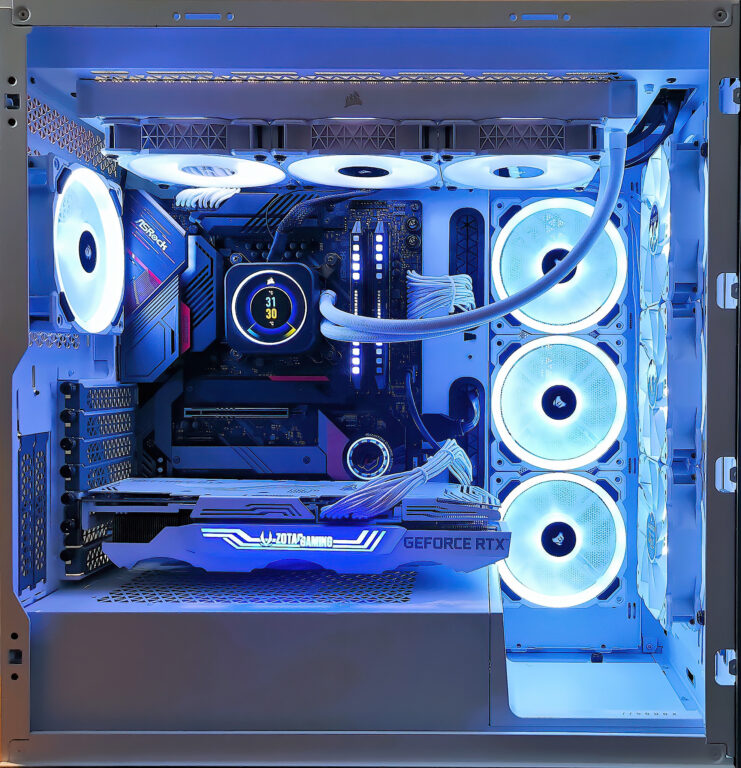TSSDR TEST BENCH AND PROTOCOL
SSD testing at TSSDR differs slightly, depending on whether we are looking at consumer or enterprise storage media. For our Lexar Professional NM800 Pro 2TB Gen4 NVMe SSD testing today, our goal is to test in a system that has been optimized with our SSD Optimization Guide.
For this Test Bench, the CPU C-States, Enhanced Intel SpeedStep Technology (EIST) and Intel Speedshift (P-States) have not been disabled. As you will see below, the system is also bumped to 5.1GHz with memory at full speed in its XMP 2 profile.
The components of this Test Bench are detailed below. All hardware is linked for purchase and product sales may be reached by a simple click on the individual item.
INTEL Z690 PCIE 5.0 COMPONENTS
| PC CHASSIS: | Corsair 5000X RGB White Tempered Glass Chassis |
| MOTHERBOARD: | ASRock Z690 Phantom Gaming PG Velocita Gen 5 |
| CPU: | Intel 12th Gen Core i9-12900K |
| CPU COOLER: | Corsair Hydro Series H150i Capellix White |
| POWER SUPPLY: | Corsair RM850x 80Plus White |
| GRAPHICS: | ZOTAC GeForce RTX 3080 Trinity White |
| MEMORY: | Corsair Dominator Platinum RGB DDR5-5200 64GB |
| STORAGE: | Sabrent Rocket 4 Plus Gen 4 4TB NVMe SSD |
| KEYBOARD: | Corsair K70 RGB Mk. 2 SE White Gaming |
| MOUSE: | Corsair M65 RGB Elite FPS Gaming |
| MONITOR: | Samsung 34″ 1440p WQHD Ultrawide Gaming |
BENCHMARK SOFTWARE
The software in use for today’s analysis is typical of many of our reviews and consists of Crystal Disk Info, ATTO Disk Benchmark, Crystal Disk Mark, AS SSD, Anvil’s Storage Utilities, AJA, TxBench, PCMark 10, 3DMark, PassMark Performance Test, Final Fantasy XIV Gaming BenchMark, as well as true data testing. Our selection of software allows each to build on the last and to provide validation to results already obtained.
CRYSTAL DISK INFO VER. 8.17.7 X64
Crystal Disk Info is a great tool for displaying the characteristics and health of storage devices. It displays everything from temperatures, the number of hours the device has been powered, and even to the extent of informing you of the firmware of the device.
Crystal DiskInfo validates that our SSD is running in PCIe 4.0 x4, using the NVMe 1.4 protocol and confirms that it is TRIM capable. 52°C is the hottest we could push this SSD with the heatsink attached. Without the heatsink, surprisingly its highest temperature was 62°C.
ATTO Disk Benchmark is perhaps one of the oldest benchmarks going and is definitely the main staple for manufacturer performance specifications. ATTO uses RAW or compressible data and, for our benchmarks, we use a set length of 256mb and test both the read and write performance of various transfer sizes ranging from 0.5 to 8192kb. Manufacturers prefer this method of testing as it deals with raw (compressible) data rather than random (includes incompressible data) which, although more realistic, results in lower performance results.
ATTO performance hits highs of 6.67 GB/s read and 6.23 GB/s write as we might expect from this SSD in this specific bench. It is also good to see solid and consistent data throughput progression as sample sizes increased.
 The SSD Review The Worlds Dedicated SSD Education and Review Resource |
The SSD Review The Worlds Dedicated SSD Education and Review Resource | 

